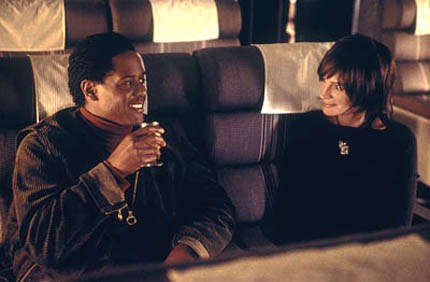Full Frontal is easily Steven Soderbergh’s least loved film. Not only did it follow the well-received Traffic and Ocean’s Eleven, but it also somewhat falsely advertised itself as a “sequel” to Sex, Lies and Videotape. Objectively speaking, its clunky, documentary-style aesthetic, paired with an often thin plot is what off-puts the majority of audiences even willing to give it a chance.
But for those who can look past some of its more glaring flaws, there truly are some memorable, even brilliant elements to the film. Coleman Hough’s true-to-real-life dialogue script is peppered in with the challenge of creating the film within a film concept as Francesca (Julia Roberts), a cliche in temperament film actress plays the role of Catherine, a reporter with a crush on B-rate actor Nicholas, being played by B-rate actor Calvin (Blair Underwood), co-starring in a movie with Brad Pitt (parodied to perfection by himself).
And then there is the god-like presence of a rarely scene producer powerhouse by the name of Gus (David Duchovny), whose fortieth birthday party brings together the unlikeliest of Hollywood ilk, from the lowest of the low, like Lee (Catherine Keener, always a gem), a ruthless talent agent to the most revered, like Francesca.
The intro to the film sets the stage for all the archetypes of Tinseltown, and in this respect, does mirror a certain Sex, Lies and Videotape slant, if the aforementioned were about the film industry. Francesca, channeling the ultimate Hollywood diva, admits, “I’ve done some mean things in my life. Yeah. And sometimes, the–ahem, ahem–the worst part is that sometimes…it doesn’t bother me. I just say, well, yeah, this is mean. I wanted to be mean, and I was mean. Period.” And then there is Lee, who insists vitriolic appraisal is a natural part of life–at least in Los Angeles–as she states, “Well, I have to be somewhat judgmental…because of what I do, you know…so I don’t think that it’s such a bad thing…to be judgmental. I think that’s how you get through life. You have to assess things…and people do it about you all the time…and that’s life, and it’s too bad.”
As the barrage of personal thoughts wanes, the plot begins to materialize with the film within a film: Catherine meets Nicholas at the airport to begin their intimate interview. While on the plane together, Nicholas finds a love letter next to him after falling asleep that reads, “Nicholas. I will begin simply. I love you, have always loved you, and will always love you. Ever since the moment I met you, the love I feel for you is overwhelming. When we are apart, you are all I think about, and can’t wait until we are just even in the same room again. Until then.” Assuming this is some sort of twisted joke Catherine is playing on him, Nicholas stirs her from her slumber to confront her about it, but she laughingly denies having anything to do with it. Soderbergh’s tongue-in-cheek reference to the vast majority of every cheesy rom-com Roberts has ever been in does not go unnoticed in this scenario, and every scene of her and Underwood in this “fake movie” thereafter. This self-referential vibe is one of the most deliciously voyeuristic characteristics of Full Frontal, and why it shouldn’t be so quickly cast aside or written off as forgettable riffraff.
As the day builds toward Gus’ birthday party, we are at last introduced to Gus himself, a typical sleazoid who implores his massage therapist to give him a happy ending regardless of how overtly averse she is to this proposal. But, as though to test the limits of morality, Gus offers her $500 to do it, a financial tantalization she is unable to resist. In this respect, too, Full Frontal spotlights the ways in which even those on the periphery of the film business are subject to its seediness. Fittingly, the year the movie came out, 2002, occurred during a time when the U.S. was shifting back toward a more subterfuge-laden, spy-happy existence in the wake of 9/11. This sense of looking in on people’s lives in all their harmless grittiness and mundanity is omnipresent throughout Full Frontal.





















